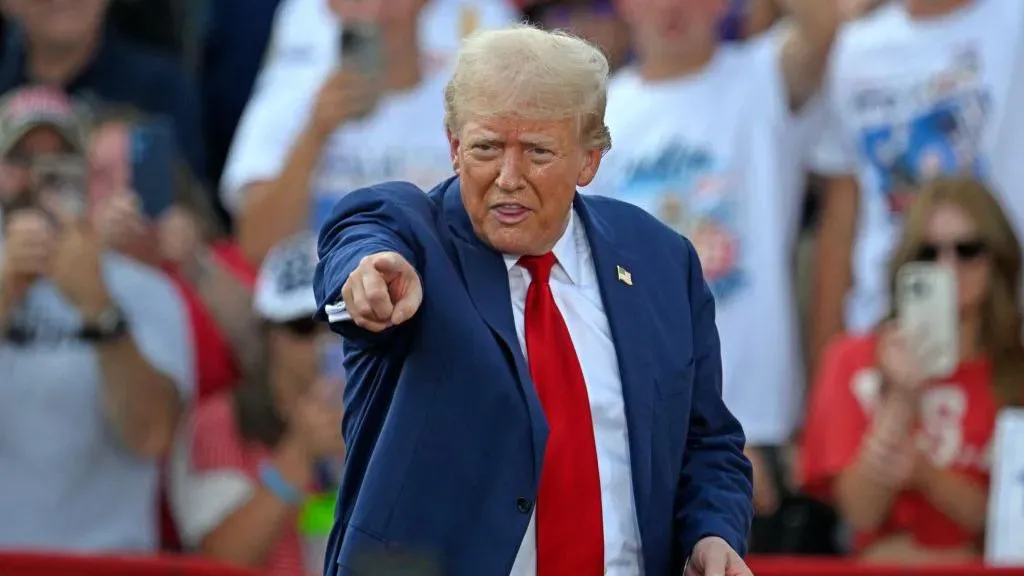As the Democratic National Convention (DNC) unfolds in Chicago, former President Donald Trump, though not physically present, is closely monitoring the events from afar. His reaction to the convention’s attacks has been one of noticeable irritation, influencing his campaign strategy and public statements.
Trump’s Presence Looms Over the DNC
While Donald Trump is not in Chicago, his influence is palpable. Despite claims from some aides that Trump is disinterested in the Democratic Convention, a senior campaign official confirmed that he is indeed watching and is clearly frustrated by the attacks directed at him. This frustration has led to a shift in his campaign focus.
The Shift in Campaign Strategy
Earlier in the week, Trump’s campaign was centered on key topics such as the economy, border security, and crime. Trump had scheduled a series of rallies in Pennsylvania, Michigan, North Carolina, and Arizona, each designed to emphasize these issues. However, the relentless criticism from the convention has disrupted this strategy.
Trump’s rally in North Carolina demonstrated his frustration with his campaign’s messaging advice. “They always say, ‘Sir, please stick to policy, don’t get personal,’” Trump remarked, referring to his advisers’ requests to avoid personal attacks. “And yet [the Democrats are] getting personal all night long, these people. Do I still have to stick to policy?” The crowd’s enthusiastic response to Trump’s personal attacks over policy proposals underscored his dilemma.
Campaign Challenges and Strategic Shifts
The campaign’s difficulty lies in balancing Trump’s desire for controversy with a strategic focus on policy issues. Trump’s advisers are concerned that his penchant for controversial remarks is overshadowing his campaign’s policy agenda. The Trump team faces the challenge of keeping him on message while managing the fallout from his personal attacks.
Trump’s social media activity reflects this shift. Late on Wednesday, he criticized Pennsylvania Governor Josh Shapiro, who had delivered a notable speech at the DNC. Trump’s comment, which included a reference to Shapiro’s Jewish heritage, sparked controversy and was interpreted by some as a racial dog whistle. This criticism illustrates Trump’s tendency to make provocative statements that divert attention from his campaign’s intended message.
Controversial Remarks and Their Impact
The former president’s response to criticism from the Obamas at the DNC also highlights his strategy of leveraging controversy. Trump’s mention of Barack Obama’s middle name during a rally in North Carolina, coupled with his derogatory remarks, drew parallels to previous criticisms aimed at stoking racial tensions. This approach creates a challenge for his campaign as it diverts attention from substantive policy discussions.
One Trump adviser expressed concern that controversial comments undermine efforts to highlight policy weaknesses in his opponents. “It doesn’t matter what he talks about for 45 minutes,” the adviser said. “One comment or answer to a question gives the left all they need to change the subject.” This dynamic complicates the campaign’s ability to focus on policy issues and manage Trump’s controversial tendencies.
The Future of Trump’s Campaign Strategy
As the DNC continues and attacks against Trump persist, the former president’s campaign strategy remains fluid. His inclination to respond to personal attacks with counterattacks has become a defining feature of his public persona. This approach may energize his base but also complicates efforts to maintain a consistent and focused campaign message.
The Trump campaign’s challenge is to navigate this tumultuous period while managing the impact of Trump’s controversial remarks. The shift from policy-focused messaging to personal attacks reflects the broader struggles faced by Trump’s campaign as it seeks to balance controversy with a coherent political strategy.


